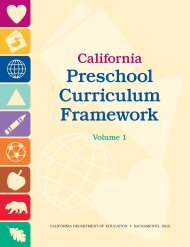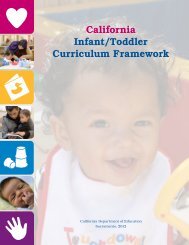California Preschool Learning Foundations - ECEZero2Three ...
California Preschool Learning Foundations - ECEZero2Three ...
California Preschool Learning Foundations - ECEZero2Three ...
Create successful ePaper yourself
Turn your PDF publications into a flip-book with our unique Google optimized e-Paper software.
SOCIAL-EMOTIONAL DEVELOPMENT<br />
24<br />
children advance from a theory of mind<br />
that is focused primarily on comprehending<br />
others’ intentions, desires,<br />
and feelings as motivators of behavior,<br />
to a more advanced theory of mind in<br />
which they also understand the nature<br />
of people’s thoughts and beliefs as<br />
motivators of behavior. One of the central<br />
features of this conceptual advance<br />
is the four-year-old’s emerging understanding<br />
that people’s beliefs can be<br />
mistaken; thus, others can be misled<br />
or fooled, and the child’s own feelings<br />
can be hidden or masked. The research<br />
literature on developing theory of mind<br />
is vast; recent summaries can be found<br />
in Wellman (2002) and Harris (2006).<br />
Although young children’s understanding<br />
of the internal determinants<br />
of behavior remains rudimentary, there<br />
is evidence that they are already beginning<br />
to comprehend the concept of<br />
personality characteristics and their<br />
association with enduring behavioral<br />
characteristics in others. This emerging<br />
understanding parallels similar<br />
advances in their ability to perceive<br />
themselves in terms of psychological<br />
characteristics as well, as is discussed<br />
in the bibliographic note on self-awareness.<br />
Research by Heyman and her<br />
colleagues shows that by the later preschool<br />
years, children are beginning to<br />
derive personality-like generalizations<br />
about the behavior of others (see Giles<br />
and Heyman 2005a, 2005b; Heyman,<br />
Gee, and Giles 2003; Heyman and<br />
Gelman 2000).<br />
One of the central features of this<br />
conceptual advance is the<br />
four-year-old’s emerging<br />
understanding that people’s beliefs<br />
can be mistaken . . .<br />
There is also vigorous research<br />
literature on young children’s<br />
developing emotion understanding,<br />
an aspect of theory of mind that<br />
is especially important to social<br />
competence. This research shows<br />
that from three to five years of age,<br />
young children become increasingly<br />
capable of identifying a broader<br />
range of emotions and describing<br />
prototypical situations in which these<br />
emotions might be elicited. They<br />
also become capable of explaining<br />
the causes of these emotions and<br />
their consequences in ways that<br />
reveal a greater understanding of<br />
the psychological bases of emotional<br />
experience (e.g., frustrated goals with<br />
respect to anger). This is consistent,<br />
of course, with broader characteristics<br />
of their developing theory of mind.<br />
The research on developing emotion<br />
understanding is reviewed by Denham<br />
(1998, 2006), Harris (1989), Lagattuta<br />
and Thompson (2007), Saarni and<br />
others (2006), and Thompson (in<br />
press; Thompson 2006; Thompson,<br />
Goodvin, and Meyer 2006; Thompson<br />
and Lagattuta 2006).<br />
The later preschool years also witness<br />
growth in event knowledge—that<br />
is, the capacity to comprehend and<br />
predict everyday routines—which is an<br />
important component of social understanding.<br />
Young preschool children<br />
can describe the sequence of events<br />
that characterize everyday routines<br />
and experiences in their lives (e.g., a<br />
trip to the grocery store), and older<br />
preschool children have more comprehensive<br />
knowledge of these events<br />
(see Hudson 1993; Narratives from the<br />
Crib 1989; Nelson 1993).<br />
Finally, the preschool years also<br />
witness young children’s growing<br />
<strong>Preschool</strong> <strong>Learning</strong> <strong>Foundations</strong>, Volume 1 • <strong>California</strong> Department of Education
















